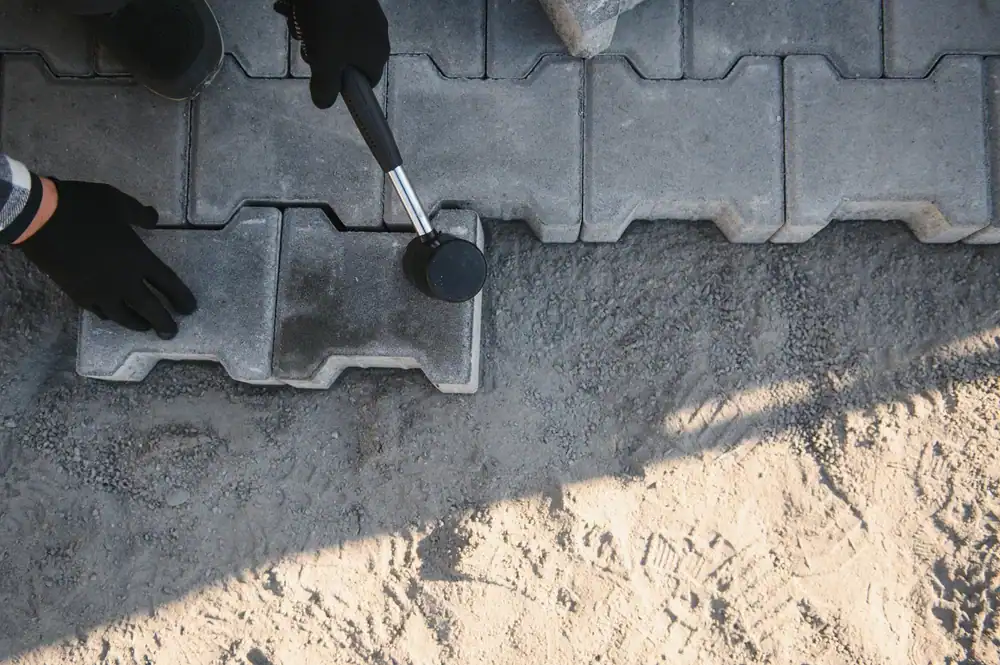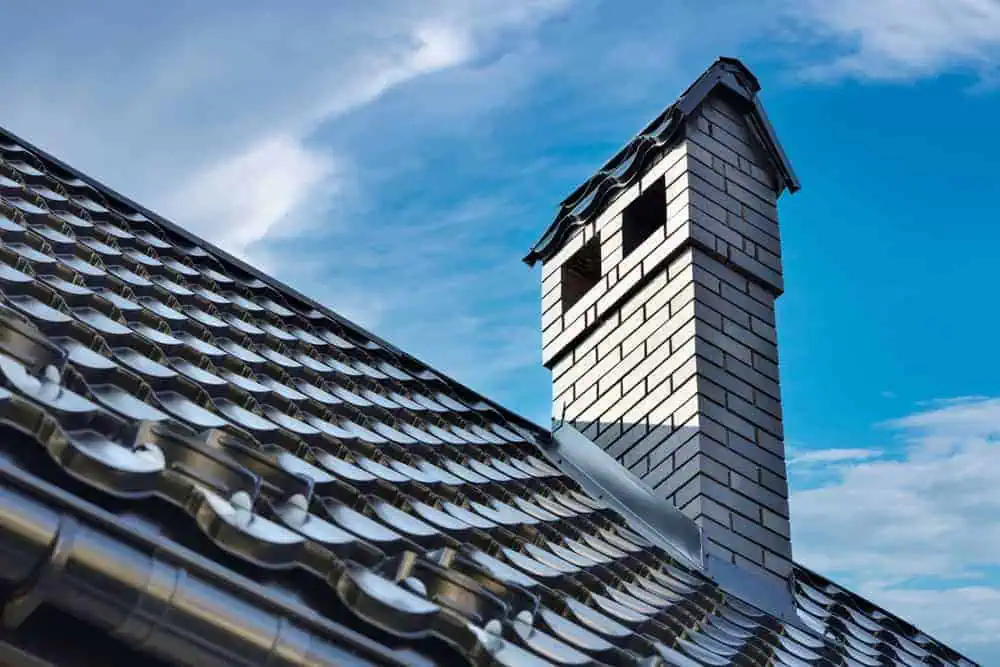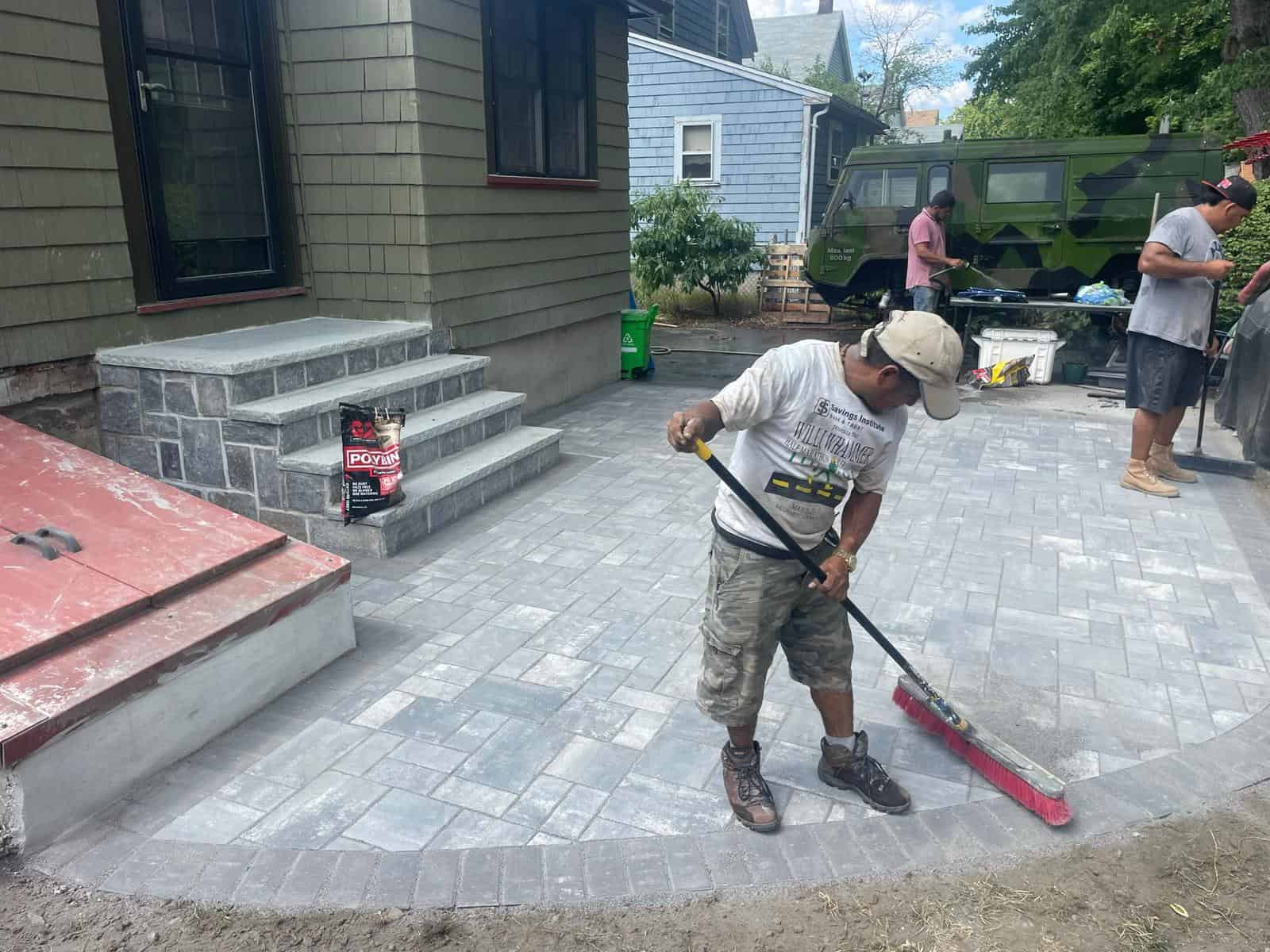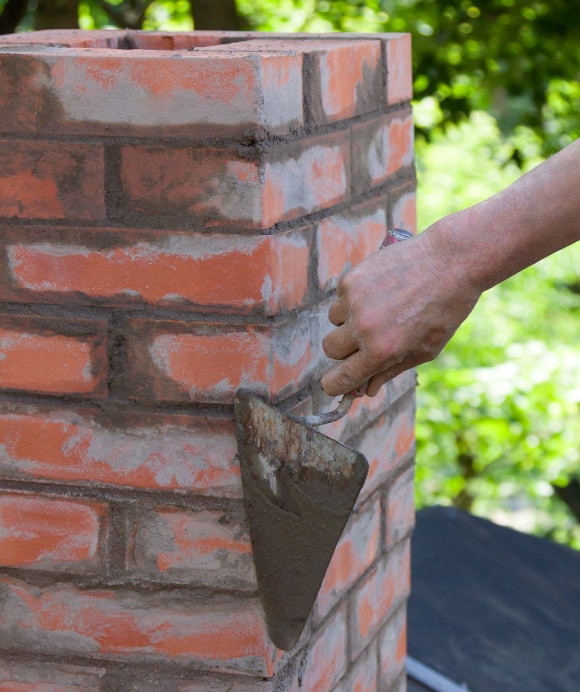Summary:
Why Boston Paving Contractors Must Understand Freeze-Thaw Cycles
Most paving failures in Boston happen for the same reason—water gets into cracks, freezes, expands, and breaks the surface apart. This isn’t a small problem. When water freezes, it expands by about 9%, creating pressure that can exceed 220 MPa.
That’s enough force to crack concrete and heave asphalt driveways. The damage compounds every winter as small cracks become larger ones, eventually requiring complete replacement.
We know this at Academy Masonry. We choose materials and installation methods that account for ground movement, proper drainage, and the flexibility needed to handle temperature swings from -10°F to 90°F.
How Proper Paver Installation Prevents Freeze Damage
Individual pavers handle freeze-thaw cycles differently than poured concrete or asphalt. Instead of creating one large surface that must expand and contract as a unit, pavers create a flexible system with small gaps between each piece.
When the ground moves due to frost heaving, pavers can shift slightly without cracking. The key is proper base preparation—removing inadequate material, installing the right depth of compacted stone base, and using edge restraints designed for local soil conditions.
At Academy Masonry, we remove old concrete in most Boston installations rather than paving over it. This approach costs more upfront but prevents drainage problems and allows us to address underlying foundation issues. You get better long-term results and avoid the settling problems that come from shortcuts.
The installation process matters as much as the materials. We use compacted stone bases designed for New England soil conditions, install proper edge restraints, and ensure adequate drainage away from your home’s foundation. Every paver gets set level and locked in place with polymeric sand that resists washout during heavy rains.
Materials That Actually Work in Boston Weather
Individual pavers handle freeze-thaw cycles differently than poured concrete or asphalt. Instead of creating one large surface that must expand and contract as a unit, pavers create a flexible system with small gaps between each piece.
When the ground moves due to frost heaving, pavers can shift slightly without cracking. The key is proper base preparation—removing inadequate material, installing the right depth of compacted stone base, and using edge restraints designed for local soil conditions.
At Academy Masonry, we remove old concrete in most Boston installations rather than paving over it. This approach costs more upfront but prevents drainage problems and allows us to address underlying foundation issues. You get better long-term results and avoid the settling problems that come from shortcuts.
The installation process matters as much as the materials. We use compacted stone bases designed for New England soil conditions, install proper edge restraints, and ensure adequate drainage away from your home’s foundation. Every paver gets set level and locked in place with polymeric sand that resists washout during heavy rains.
What to Expect from Professional Paving Installation in Boston
Professional paving installation starts with understanding your property’s specific challenges. Boston-area homes deal with everything from clay soil that shifts with moisture to drainage issues that can undermine even the best materials.
A proper consultation includes site evaluation, discussion of your goals and budget, and recommendations based on your property’s unique conditions. You should get a clear timeline, detailed scope of work, and transparent pricing before any work begins.
The installation process typically takes several days depending on the project size. This includes excavation, base preparation, material delivery, installation, and cleanup.
The Academy Masonry Installation Process
We start every project with a thorough site evaluation and consultation. This includes measuring the area, assessing drainage patterns, checking soil conditions, and discussing your vision for the finished space.
Our installation process follows proven methods developed through years of working in Boston’s challenging conditions. We excavate to the proper depth, install and compact base materials in lifts, set edge restraints, and place each paver level and tight. The final step involves sweeping polymeric sand into joints and compacting the entire surface.
We don’t cut corners on base preparation because we know it determines how long your installation lasts. Most paving failures happen because of inadequate base work, not material problems. We remove old concrete when necessary, address drainage issues, and use base materials appropriate for local soil conditions.
Every installation includes proper edge restraints designed for your specific application. These prevent pavers from shifting over time and maintain clean lines along borders and curves. We also ensure adequate drainage away from your home’s foundation to prevent water damage and frost heaving issues.
Timeline and What Happens During Installation
Most residential paving projects take 3-5 days from start to finish, depending on size and complexity. We schedule work to minimize disruption to your daily routine and coordinate with you on access needs and material deliveries.
Day one typically involves excavation and base preparation. We remove existing materials, excavate to proper depth, and begin installing base materials. This is the messiest part of the process but also the most important for long-term performance.
Days two and three focus on completing base work, setting edge restraints, and beginning paver installation. We work systematically to ensure proper alignment and consistent gaps between pavers. The final day involves completing installation, sweeping sand into joints, compacting the surface, and cleanup.
Weather can affect the timeline, especially during Boston’s unpredictable spring and fall seasons. We monitor forecasts and adjust schedules when necessary to ensure quality results. It’s better to delay a day than to install pavers in conditions that compromise long-term performance.
We handle all permits and inspections required for your project. Most residential paving work doesn’t require permits, but we check local requirements and handle paperwork when needed. You shouldn’t have to deal with bureaucracy when you’re already managing a construction project.
Choose Paving Installation That Lasts in Boston's Climate
Boston’s weather demands paving solutions designed for freeze-thaw cycles, heavy snow loads, and dramatic temperature swings. The right materials and installation methods make the difference between a driveway that lasts decades and one that needs constant repairs.
Academy Masonry has spent years learning what works in New England’s challenging conditions. We use materials rated for local climate conditions, follow installation methods proven in Boston neighborhoods, and stand behind our work with transparent communication and competitive pricing.
When you’re ready to transform your driveway, patio, or walkway with paving that actually lasts, contact Academy Masonry for a consultation. We’ll assess your property’s specific needs and provide recommendations based on your goals and budget.




